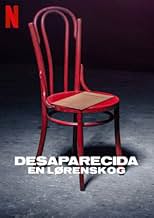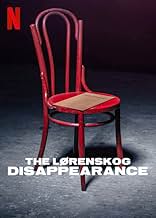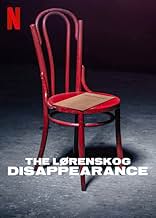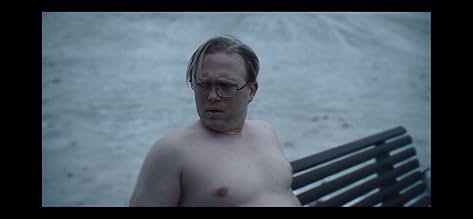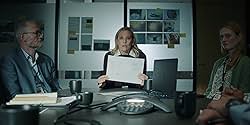La Disparue de Lørenskog
Titre original : Forsvinningen - Lørenskog 31. oktober 2018
NOTE IMDb
6,0/10
3,2 k
MA NOTE
Lorsque la femme d'un millionnaire disparaît, la police doit faire face à la frénésie des médias et à des indics véreux pour découvrir la vérité. Inspiré de faits réels.Lorsque la femme d'un millionnaire disparaît, la police doit faire face à la frénésie des médias et à des indics véreux pour découvrir la vérité. Inspiré de faits réels.Lorsque la femme d'un millionnaire disparaît, la police doit faire face à la frénésie des médias et à des indics véreux pour découvrir la vérité. Inspiré de faits réels.
Parcourir les épisodes
Avis à la une
As Episode 1 of "The Lorenskog Disappearance" (2022 release from Norway; 5 episodes of about 50 min each) opens, we are reminded that this is "based on real events". It is "31 October 2018" and a man calls 911 as his wife has disappeared from their house, and a ransom letter was left by the kidnappers with instructions. Turns out this guy, Tom, is one of Norway's richest persons, despite a very modest life style. At this point we are 10 min into Episode 1.
Couple of comments: I (and millions like me) love me a good true crime story. Even though it's based on real events, I knew absolutely nothing about this when I started watching, and I think that only upped the entertainment level a notch or two. The series is structured from different entrance points, for example Ep 1 centers on "The Investigators", Ep 2 on "The Journalists", Ep 3 on "The Lawyers", etc. In the end we are all dying to find out how all of this will end. I was not familiar with any of the cast or the production team, and I> can only say that they did a great job making this into a compelling true crime mini-series.
I'm not sure when this first started streaming on Netflix, probably a couple of months ago. Netflix suggested it to me the other day, and I gladly took them up on it. I've seen 3 episodes so far (last night), and can't wait to see the last 2 tonight. If you are in the mood for a compelling true crime mini-series from Norway, I'd readily suggest you check this out, and draw your own conclusion.
Couple of comments: I (and millions like me) love me a good true crime story. Even though it's based on real events, I knew absolutely nothing about this when I started watching, and I think that only upped the entertainment level a notch or two. The series is structured from different entrance points, for example Ep 1 centers on "The Investigators", Ep 2 on "The Journalists", Ep 3 on "The Lawyers", etc. In the end we are all dying to find out how all of this will end. I was not familiar with any of the cast or the production team, and I> can only say that they did a great job making this into a compelling true crime mini-series.
I'm not sure when this first started streaming on Netflix, probably a couple of months ago. Netflix suggested it to me the other day, and I gladly took them up on it. I've seen 3 episodes so far (last night), and can't wait to see the last 2 tonight. If you are in the mood for a compelling true crime mini-series from Norway, I'd readily suggest you check this out, and draw your own conclusion.
Vaguely remember the case on which this series is based. It was also relatively well reported here in Finland. The series follows events from different angles and perspectives. The series is followed episode by episode from the point of view of the police, lawyers, journalists and relatives.
I used to be in favour of a non-linear and multi-perspective series. Over time, however, the problem has become that these elements have become a way of prolonging the series without adding any value to the story itself or depth to the characters. I like slow-burning series, but there has to be a reason for that slow-burning. Nowadays, many series should just be a 1,5h movie because there is no true content for many episodes.
Fortunately, however, this series was different. Five episodes of guaranteed quality. I found that I actually liked almost every character in the series. I could relate to their perspectives and attitudes. The series illustrates well how easily our history and temperament can affect our ability to look at things objectively.
I also liked the fact that the personal lives of the main characters were referred and shown, but mostly in a condensed form. Glimpses. Everyone can then draw their own conclusions. For example, many police series stray far too much from the plot itself to deal with family traumas and other relationship issues. Of course, human being is a whole, but often too much emphasis is placed on these subplots.
Many people seem to be annoyed by the end of the series. The series is largely based on real events, including the names. In such cases, you cannot make your own artistic decisions. Personally, I liked the ending of the series. The way it affected the lives of the people involved.
It also reminded me of a case we had here in Finland. It was the case of Anneli Auer. She supposedly murdered her husband. However, the director of the investigation forbid the investigators of investigating Anneli Auer, even though she was the wife of the murdered and was present when the murder took place. Anneli Auer is an obvious psychopath and she was very good at manipulation. Anneli Auer was not taken as a suspect until two years after the murder, at which point no proper investigation could be carried out. The court acquitted Anneli Auer, even though she is very probably behind the murder of her husband. It really reminded this case in many ways.
I used to be in favour of a non-linear and multi-perspective series. Over time, however, the problem has become that these elements have become a way of prolonging the series without adding any value to the story itself or depth to the characters. I like slow-burning series, but there has to be a reason for that slow-burning. Nowadays, many series should just be a 1,5h movie because there is no true content for many episodes.
Fortunately, however, this series was different. Five episodes of guaranteed quality. I found that I actually liked almost every character in the series. I could relate to their perspectives and attitudes. The series illustrates well how easily our history and temperament can affect our ability to look at things objectively.
I also liked the fact that the personal lives of the main characters were referred and shown, but mostly in a condensed form. Glimpses. Everyone can then draw their own conclusions. For example, many police series stray far too much from the plot itself to deal with family traumas and other relationship issues. Of course, human being is a whole, but often too much emphasis is placed on these subplots.
Many people seem to be annoyed by the end of the series. The series is largely based on real events, including the names. In such cases, you cannot make your own artistic decisions. Personally, I liked the ending of the series. The way it affected the lives of the people involved.
It also reminded me of a case we had here in Finland. It was the case of Anneli Auer. She supposedly murdered her husband. However, the director of the investigation forbid the investigators of investigating Anneli Auer, even though she was the wife of the murdered and was present when the murder took place. Anneli Auer is an obvious psychopath and she was very good at manipulation. Anneli Auer was not taken as a suspect until two years after the murder, at which point no proper investigation could be carried out. The court acquitted Anneli Auer, even though she is very probably behind the murder of her husband. It really reminded this case in many ways.
A Norwegian thriller based on true events.
This kidnapping story could have been packed in one movie and not divided in seven hours episodes. Too long because it couldn't keep enough my attention with suspense or intriguing elements. At the end of the second part I switched off. Okay, in the first part these ingredients were shown but the longer it run the more I was bored to continue watching these seven part limited series. Yes, luckily only limited. Watch instead the top Hollywood kidnapping movies Trapped, Cellular with Kim Basinger, Panic Room with Julianne Moore or The Call with Halle Berry.
This kidnapping story could have been packed in one movie and not divided in seven hours episodes. Too long because it couldn't keep enough my attention with suspense or intriguing elements. At the end of the second part I switched off. Okay, in the first part these ingredients were shown but the longer it run the more I was bored to continue watching these seven part limited series. Yes, luckily only limited. Watch instead the top Hollywood kidnapping movies Trapped, Cellular with Kim Basinger, Panic Room with Julianne Moore or The Call with Halle Berry.
Summary
The novelty of this cold and intelligent Norwegian series based on a real case is that each chapter focuses on one of the sectors involved in the case and as the investigation progresses.
Review
This Norwegian mini-series based on a true case recounts the investigation of the disappearance of the wife of a Norwegian billionaire, in what appears to be a kidnapping.
The novelty of this series lies in the fact that each chapter focuses on one of the groups involved in the case and as the investigation progresses, for example: the first focuses on the police and prosecutors, the next on the journalists who investigate the case, and so on. The change of point of view then does not imply flashbacks that return to certain events, in general, nor the absence of the other protagonists, who circumstantially pass into the background. I must add that there would be some important stratum missing as the protagonist of some chapter...
The tone of the series is cold but its notes on how these groups are related and how prejudices and personal stories work in their working hypotheses are very interesting (particularly in the case of the press) as well as on the role of cryptocurrencies in kidnapping for ransom.
Needless to say, the ending is disappointing, and for more than one reason (which I can't reveal).
The novelty of this cold and intelligent Norwegian series based on a real case is that each chapter focuses on one of the sectors involved in the case and as the investigation progresses.
Review
This Norwegian mini-series based on a true case recounts the investigation of the disappearance of the wife of a Norwegian billionaire, in what appears to be a kidnapping.
The novelty of this series lies in the fact that each chapter focuses on one of the groups involved in the case and as the investigation progresses, for example: the first focuses on the police and prosecutors, the next on the journalists who investigate the case, and so on. The change of point of view then does not imply flashbacks that return to certain events, in general, nor the absence of the other protagonists, who circumstantially pass into the background. I must add that there would be some important stratum missing as the protagonist of some chapter...
The tone of the series is cold but its notes on how these groups are related and how prejudices and personal stories work in their working hypotheses are very interesting (particularly in the case of the press) as well as on the role of cryptocurrencies in kidnapping for ransom.
Needless to say, the ending is disappointing, and for more than one reason (which I can't reveal).
8rbod
I don't know how this could be made unless it is explicitly sanctioned by both the authority that investigates and charges crime AND the people that make up the persons of interest. I can't imagine why anyone would agree to it.
Not what I would call a documentary.
Anyway, aside from that I did enjoy it as an entertainment, which I think is problematic as a "true" story.
Now my problem with the presentation in one crucial aspect of "evidence" as presented. The language as we know is Norwegian. I watched it dubbed in English with English captions. As is often the case, the spoken dialogue does not match the captions. Normally this is not a problem, but: Tom Hagen is about 70 and has been married for 49 years to his disappeared wife.
The film has the prenuptial agreement signed in 1993 I believe, which would have put their wedding at around 1973.
1993 is 29 years ago, not 49. Giving more weight to this observation, the dialogue says prenup, the caption says marital agreement. Ordinarily one would not make a fuss over this language discrepancy, except, you cannot have a prenuptial agreement when you've already been married for 20 years.
So, this was not a prenup but an agreement made after 20 years of marriage. It casts an entirely different light on the story, because although it was clear an error was made, what the error was was not clear. Was the year of the agreement 1973 and therefore a prenup (no, I don't think so) or was it not a prenup but a marital agreement made after 20 years of marriage (yes, I think) Although I figured it out I was not 100 percent sure and thought about it the whole time I was watching which was a distraction I could have done without.
It is not evidence of a crime, however, but changes the idea of motive.
If one were not paying close attention to do the math, and not having captions on they saw a different film from me.
I am very disappointed.
Not what I would call a documentary.
Anyway, aside from that I did enjoy it as an entertainment, which I think is problematic as a "true" story.
Now my problem with the presentation in one crucial aspect of "evidence" as presented. The language as we know is Norwegian. I watched it dubbed in English with English captions. As is often the case, the spoken dialogue does not match the captions. Normally this is not a problem, but: Tom Hagen is about 70 and has been married for 49 years to his disappeared wife.
The film has the prenuptial agreement signed in 1993 I believe, which would have put their wedding at around 1973.
1993 is 29 years ago, not 49. Giving more weight to this observation, the dialogue says prenup, the caption says marital agreement. Ordinarily one would not make a fuss over this language discrepancy, except, you cannot have a prenuptial agreement when you've already been married for 20 years.
So, this was not a prenup but an agreement made after 20 years of marriage. It casts an entirely different light on the story, because although it was clear an error was made, what the error was was not clear. Was the year of the agreement 1973 and therefore a prenup (no, I don't think so) or was it not a prenup but a marital agreement made after 20 years of marriage (yes, I think) Although I figured it out I was not 100 percent sure and thought about it the whole time I was watching which was a distraction I could have done without.
It is not evidence of a crime, however, but changes the idea of motive.
If one were not paying close attention to do the math, and not having captions on they saw a different film from me.
I am very disappointed.
Le saviez-vous
- AnecdotesToutes les informations contiennent des spoilers
Meilleurs choix
Connectez-vous pour évaluer et suivre la liste de favoris afin de recevoir des recommandations personnalisées
- How many seasons does The Lørenskog Disappearance have?Alimenté par Alexa
Détails
- Date de sortie
- Pays d’origine
- Site officiel
- Langue
- Aussi connu sous le nom de
- The Lørenskog Disappearance
- Société de production
- Voir plus de crédits d'entreprise sur IMDbPro
- Durée52 minutes
- Couleur
- Mixage
Contribuer à cette page
Suggérer une modification ou ajouter du contenu manquant


